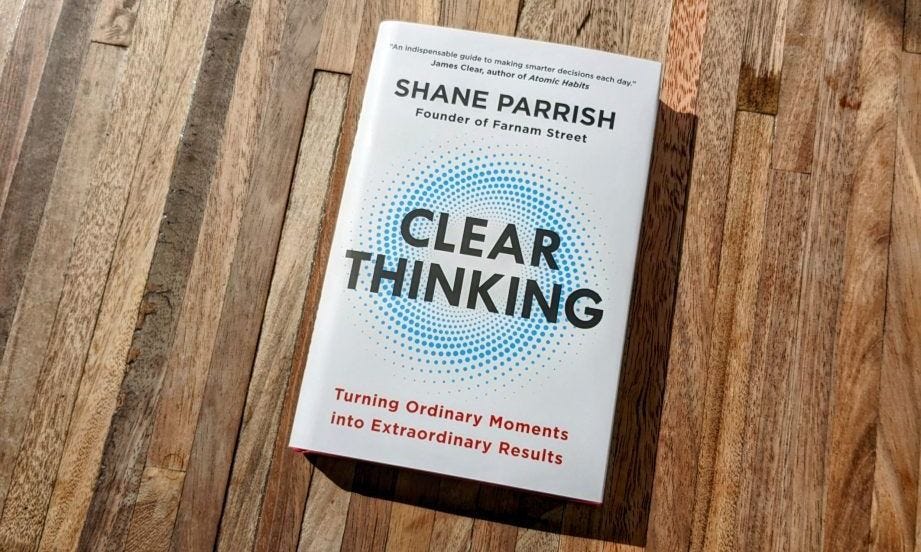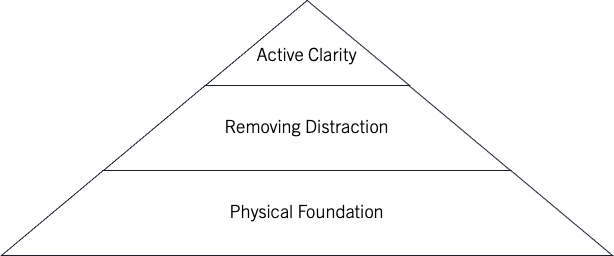Tuesday's Rule #9
Clear Thinking
You shouldn't judge a book by its cover, but in some cases it is inevitable.
In October, Shane Parrish released his latest book - Clear Thinking.
I didn't have to read another word to know I’d love it.
The book's full title is "Clear Thinking: Turning Ordinary Moments Into Extraordinary Results".
And that's where this week's rule comes from:
Own Ordinary Moments
When thinking about important moments in life, we often think to choices or decisions we have taken, or will take. Who we have made our friends and partners, jobs we have taken, the places we have decided to live.
It is how successfully we navigate these big decisions that will determine the success of our life.
This rule disagrees.
My favourite quote from the book is:
What a lot of people miss is that ordinary moments determine your position and your position determines your options.
Clear thinking is the key to proper positioning, which is what allows you to master your circumstances rather than be mastered by them.
Let's break that down.
Your position determines your options because a good position allows you to consider and decide for yourself what's best, rather than be forced by your circumstances into taking a particular path.
In other words, if you have allowed yourself to get into a position where you only have one option, your circumstances have forced you into choosing that option, which may not be optimal. However, if you have managed to put yourself into a position with multiple options, there may be many paths to victory, and it is you who gets to decide.
Proper positioning is key to mastering your circumstances and ordinary moments are the key to proper positioning.
What are ordinary moments?
Well, pretty much any moment could be considered an ordinary moment.
Whatever you do after finishing reading this is an ordinary moment.
How you decide to spend a quiet evening at home, is an ordinary moment.
Receiving a piece of unwelcome news from your boss is an ordinary moment.
Some ordinary moments may be more important in the long run than others. But we won't know that until later. So we must try and own them all as best we can.
The antithesis of owning ordinary moments is living life on autopilot. As the author says later in the book:
When you live a life run on autopilot, you get bad results. You make things worse. You say things that can't be unsaid and do things that can't be undone. You might accomplish your immediate goal, but you fail to realise that you've made it harder to achieve your ultimate goals.
So, to recap, positioning determines our options, which determine our success, and ordinary moments determine our positioning.
So how do we own ordinary moments..?
Through clear thinking.
Thinking clearly. All of us would love to do it more often. But it’s much easier said than done, certainly for me.
Rather than continue to plagiarise a book that I recommend everyone go and buy, I'm going to share some semi-original thinking and my “clear thinking pyramid” that has helped me think about how I can enable clear thinking:
I am a sucker for a pyramid/hierarchy. The idea is that all pyramid segments must be captured to achieve clear thinking, but you can only build upwards, one block at a time.
Block number one is the physical foundation.
Without this, there is no chance of achieving clear thinking, and the other blocks are out of reach. This means getting good sleep, decent exercise, and eating a clean diet. I need those (particularly sleep) to consistently think clearly.
Once that foundation is in place, we can move up to the next segment: removing distractions.
Part of this is obvious. If I'm sat with my mobile phone next to me, with immediate access to the world's information at my fingertips, there might be more conducive environments for clear thinking. Removing that would help.
But it's more than just physical distractions. Those around us are typically there to help, but when trying to achieve clear thinking, they can often be a distraction.
Worrying about what others think or say and trying to impress friends or colleagues is something that I need to work hard to remove to allow myself to think clearly.
With my physical foundations in place and distractions removed, I can now think about "active clarity".
This could mean something different for everyone, but this is about proactively cultivating independent thoughts, thinking for oneself and planning ahead. In a word, it’s about intention.
Here are some questions that one might ask themselves when they are operating in the tip of this pyramid:
Am I holding myself to account?
Am I choosing what not to do as well as choosing what to do?
Am I focusing on what’s right, rather than who’s right?
Am I able to change my mind?
Am I creating positive inertia?
When I’m at my best, and thinking clearly, I can ask myself these questions and can answer yes. When I’m not, these questions aren’t even on my radar.
If you’re looking to make changes, seeking to improve your ability to think clearly might be the best place to start.
You can’t pin it all on getting those big moments right, because you just don’t know when they might present themselves.
Time is the friend of someone who is well positioned and positioning can be improved via clear thinking, which is something we can all work on.
Seems worthwhile trying to me.



